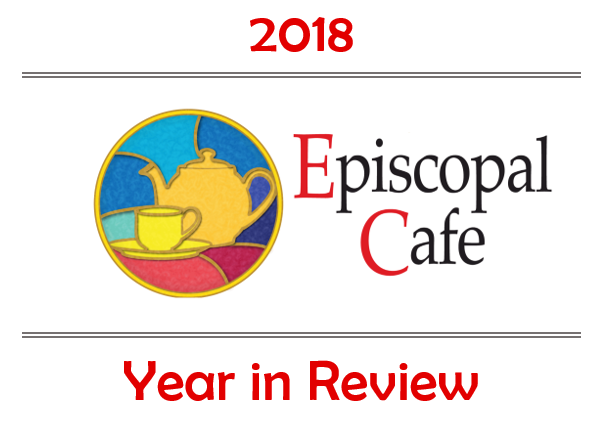It’s a busy world out there, with a lot going on. It can be challenging to discern in the daily flow of events what might end up mattering the most down the road. But we’ll try anyway; here’s our roundup of what we thought were the stories we’ll be looking back on in the future.
A Star is Born
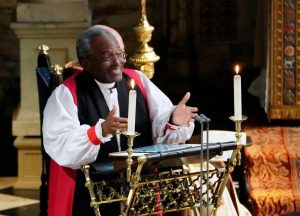
Immensely popular throughout our church, the Presiding bishop entered into a new world of celebrity this year after preaching an electrifying sermon at the royal wedding of Prince Harry and Meghan Markle in front of a worldwide television audience of nearly two billion. He was an immediate sensation on social media, was gently spoofed on Saturday Night Live, and has appeared several times on multiple shows. Curry seems to have captured the role of spokesperson for inclusive and justice-oriented Christianity. He is undoubtedly, the most widely popular and likely the most famous Presiding Bishop ever.
He seems poised to continue to bring positive press and attention to the Episcopal Church and his popularity within the church seems nearly unassailable. Aside from being an engaging preacher and evangelist, Curry has gone about the business of being Presiding Bishop more than competently. He began his tenure by working to root out an unhealthy work culture at the Church center (aka 815), has responded pastorally and clearly with bad bishop behavior (Bishop Bruno, and soon probably Bishop Love), He got high marks for his leadership of the House of Bishops, and he has been tireless in his advocacy for the “least of these.” Too bad he won’t be able to fill a second term.
Marriage Equality
 Marriage equality made further strides in the Episcopal Church with the passage of Resolution B012 at General Convention this year. This resolution removed the decision of allowing same sex marriages from the diocesan level and prerogative of the bishop and pushed it down to the parish and individual clergy level (where most decisions on marriage already reside). Of the eight remaining dioceses where marriage equality was completely restricted, most are finding ways to live with it. The one outlier is the diocese of Albany, where Bishop William Love said, in a long message that included references to a “gay agenda” and Satan’s influence, that B012 will be ignored and any clergy seeking to live within it will face disciplinary action. Even Bishop Love seems to expect there will be consequences for him from this decision.
Marriage equality made further strides in the Episcopal Church with the passage of Resolution B012 at General Convention this year. This resolution removed the decision of allowing same sex marriages from the diocesan level and prerogative of the bishop and pushed it down to the parish and individual clergy level (where most decisions on marriage already reside). Of the eight remaining dioceses where marriage equality was completely restricted, most are finding ways to live with it. The one outlier is the diocese of Albany, where Bishop William Love said, in a long message that included references to a “gay agenda” and Satan’s influence, that B012 will be ignored and any clergy seeking to live within it will face disciplinary action. Even Bishop Love seems to expect there will be consequences for him from this decision.
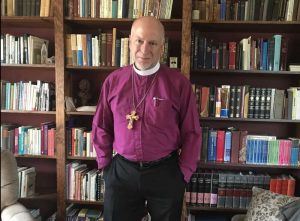 The leadership of the church cannot ignore this brazen stand. However, “ignoring GC” is not one of the causes specifically identified in Title IV for discipline; it will be interesting to see what complaints might be levelled and how they might be adjudicated. It would be a strange world indeed though, if the decision on something as central as marriage equality by the highest authority in the church cannot be implemented throughout the church.
The leadership of the church cannot ignore this brazen stand. However, “ignoring GC” is not one of the causes specifically identified in Title IV for discipline; it will be interesting to see what complaints might be levelled and how they might be adjudicated. It would be a strange world indeed though, if the decision on something as central as marriage equality by the highest authority in the church cannot be implemented throughout the church.
Immigration
Scripture enjoins us to welcome the stranger, but the exact policies we should adopt aren’t clearly laid out. Nonetheless, the Baptismal Covenant of our church does lay out that we are to treat all persons with dignity, and a majority of Episcopalians believe that the current US policies fail in that regard. In June, the governments policies to separate families and place children in detention drew condemnation from many church leaders.
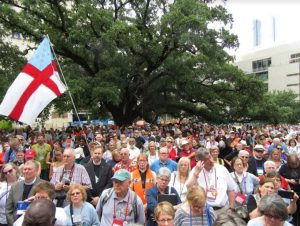
At General Convention, a rally somewhat hastily arranged just weeks before convention led to a several thousand strong protest at a nearby detention center.
And earlier this month, in response to heated rhetoric about a caravan of asylum seekers headed towards the US from Central America, Bishop Provenzano led a group to the border near Tijuana to meet with asylum seekers and to assist groups already active in ministering to refugees. Also in response to the caravan rhetoric, bishops in Central America called on Christians throughout the Americas to build a culture of hospitality. They wrote that they are using their positions as bishops “in a call of solidarity to the authorities of Central America, Mexico and the USA, United Nations and civil leadership with respect to the caravan of people who are travelling towards the United States in search of opportunities of decent work.”
They described the refugees as “a new exodus” of “a marginalised people, enslaved in their respective countries through a reality of social and moral, neo-liberal economic sin which takes away their lives with injustices and violations of their human rights. They are a people of faith in God, who He has promised to ‘care for and accompany’”.
Bishops
2017 saw the downfall of Jon Bruno in Los Angeles over his handling of the property in Newport Beach. Next year, Bishop Love in Albany may face sanction for his refusal to abide by General Convention’s desire to take marriage equality decisions out of his hands. But the big bishop story this year is how many of them are opting to retire.
2017 saw eight new diocesan bishops installed, there were four in 2018, and at least fourteen are somewhere in the process (between announcing the retirement of the current one to awaiting the consecration of a new one already elected) of finding a new bishop.
It has become an issue because of several dioceses have mentioned a “small pool” of potential bishops to justify decisions they’ve made. San Diego nominated only one person (an awesome candidate to be sure), while Nevada and Virginia have put their searches on hold (Nevada had already announced their slate before deciding to hit reset).
Twenty-six transitions is a lot (nearly a quarter of all diocesan bishops), but the numbers are not unprecedented. In a similar three-year period from 2010 to 2012, there were thirty-one transitions. The average number since 2000 is seven, though it has been as few as three and as many as 13. There are about 8000 active priests; it’s hard to believe that out of that number, that at least 70 or so wouldn’t be great bishops. Whatever problems search committees are facing, a lack of qualified candidates probably isn’t one of them – a lack of interested candidates on the other hand…
Perhaps then, this is an opportunity to re-evaluate how we identify, prepare, and call ordained persons in this church. We should take a survey of other similar church bodies to see if our call process for bishops (and other ordained clergy) works as well as it might and determine whether or not other biases and assumptions might be limiting the identification and election of qualified leaders.
On a more positive note, four dioceses ended up with all female slates. Though some voices (The Living church, ahem) were wringing their hands at this “inequality,” very little concern was elicited over the two millennia of all male slates, or that even still, the vast majority of full-time employed priests, and bishops, were males (and higher paid).
Book of Common Prayer

We went into General Convention with the Standing Committee on Liturgy and Music (SCLM) preparing to offer two alternatives, initiate a complete revision or alternately to have an extended conversation about the current back. What we came out of General Convention with is less clear. We memorialized the 1979 BCP, but what “memorialize” means wasn’t defined. At the same time, each diocese was asked to set up a mini SCLM and evaluate grass-roots liturgical innovation. Further, those diocesan committees are to feed their work into the Tooflepoober (TFLPBR: Task Force on Liturgical and Prayer Book Revision) which was created to do the work already tasked to the SCLM. How and how well this Rube Goldbergian liturgical contraption will work is anyone’s guess. Maybe that’s the point?
Perhaps this means that we’re keeping the BCP and will end up with a Book of Alternative Services (like many of our Anglican Communion partners). Or maybe we will end up with a fully revised BCP at some point at the end of this – though no end or evaluation point was defined either (though the Tooflepoober is supposed to “report” to the next GC). Oh, and essentially no money was set aside for any of this work. Last year I predicted that we wouldn’t have any wholesale revision – I’m still not clear if I was correct or not.
Other Notable Events
Cuba rejoins
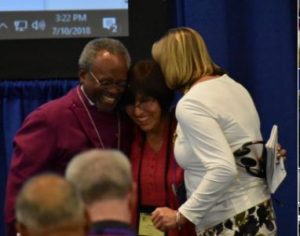
One of the many casualties of the Cold War was the separation of the diocese of Cuba from the Episcopal Church. General convention severed the ties in 1966, largely out of fear of what the Cuban government might do to clerics associated with an American church. In the interim period, the diocese was autonomous and tied to the Anglican communion through a Metropolitan Council. In an emotional moment, Bishop Maria Griselda was inaugurated into the House of Bishops, and the next day the House of Deputies made it official.
Matthew Shepard interred
Twenty years ago, a young man was horrifically beaten for being gay, tied to a fence and left to die near Laramie, WY. He died in hospital several days later. Matthew Shepard’s death was headline news around the world. In the intervening years, he was never laid to rest because his parents feared his grave would be vandalized and desecrated. As a youth, Shepard had been acolyte in his local Episcopal Church.
 The service was presided over jointly by bishops Gene Robinson and Marianne Budd. Robinson, the first openly-gay bishop, had been working with Shepard’s parents for many years on issues related to hate crimes, and he worked with the cathedral to make the internment happen. In his sermon he said; “If you close your eyes and open your hearts, Matt is right here.” Then later, weeping, he said there were three things he wanted to say to Matthew: “Gently rest in this place. You are safe now. Oh yeah, and Matt, welcome home. Amen.”
The service was presided over jointly by bishops Gene Robinson and Marianne Budd. Robinson, the first openly-gay bishop, had been working with Shepard’s parents for many years on issues related to hate crimes, and he worked with the cathedral to make the internment happen. In his sermon he said; “If you close your eyes and open your hearts, Matt is right here.” Then later, weeping, he said there were three things he wanted to say to Matthew: “Gently rest in this place. You are safe now. Oh yeah, and Matt, welcome home. Amen.”
Gun Violence
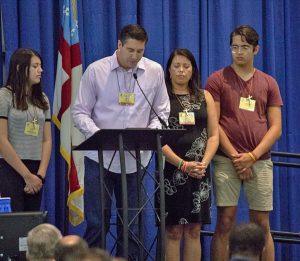
In another year with too many preventable gun deaths, many across the church were committed to actions to reduce the carnage. Bishops Against Gun Violence continued to speak out in favor of new policies. General Convention heard from Philip and April Schentrup, whose daughter Carmen had been murdered at Marjory Stoneman Douglas High in Parkland. She had been an involved member of her Episcopal parish. Speaking to those gathered for a rally on Sunday morning during General convention, her father said;
Carmen’s murder, and acts of much greater violence and cruelty are not part of God’s plan. God did not intend to inflict deep and lasting damage on my family. God is saddened by Carmen’s murder, and all the violence people are allowed to inflict upon one another. God weeps for all His children. …
Evil and violence happen in this world because we allow it, not because God allows it. God weeps for all the victims of violence. Every time we as Christians say, “That would be ideal, but that’s not realistic or practical,” we miss the opportunity God has given us to make the world He wants.
As daunting as this challenge seems, I have hope. I have hope in Jesus. I have hope in the hearts and humanity of people. … And so today I implore you. I ask everyone here to step up. To choose to make the world a better place, and then act.”
So what might 2019 bring?
Undoubtedly, the church will continue to stand for social justice and to speak out against the most outrageous policies of the government which are counter to the Baptismal Covenant. Speaking to the imperatives our faith makes claims on in a hyper partisan atmosphere without appearing to take political sides will also be a challenge. Within that, Bishop Curry’s celebrity as a progressive Christian leader coupled with his clearly articulated love of Jesus may show us the path to take in appealing to the conscience of the nation.
Invitations to the 2020 Lambeth Conference have already gone out. Though delayed by several years, seeing this gathering of bishops from across the Anglican Communion has the possibility to be an encouraging site. Expect the most conservative GAFCON provinces to be announcing boycotts though. I also wouldn’t be surprised to see the revival of something like the Anglican Covenant idea. We have a de facto division around those bishops who agree with GAFCON’s Jerusalem Declaration and those who don’t. Perhaps something of that division will become manifest at Lambeth.
At the same time, the movement towards full inclusion of LGBT+ persons and marriage equality moves forward. The big test will be whether or not the Church of England moves from its current position of equivocation and commits itself to full inclusion or not. If it does finally decide for full inclusion, they may be the long-awaited tipping point for GAFCON to declare itself separate or more likely the “real” Anglican Communion.
The church’s numerical decline will likely continue, though the rate will hopefully continue to lessen. I have every confidence that the Episcopal Church and the Anglican tradition will continue and that and our of inclusive, sacramental communal faith will not disappear. In the coming year though, we will likely see continuing closures of parishes and retrenchments. At what point the old structures give way to whatever the church will look like in 2119 is anybody’s guess. I suspect though that the foundations of that new structure are being built right under our very noses, unawares. Hopefully the changes to the Canons that will allow dioceses to explore mergers or other alternatives prior to the election of a bishop will begin to bear fruit, such as the conversations between NW Pennsylvania and Western New York seem to be. A great deal more work needs to be done in our canons to allow us to be more nimble as we adjust to no longer being supported by the unearned privileges of Christendom.
Hopefully, 2019 will also bring some resolution to the internal diocesan conflicts in Haiti, so that ministry in our largest diocese might grow and prosper.
And finally, whatever 2019 brings, the Episcopal Cafe team will continue to share those stories with you. Blessings on the new year and on you, our readers.

